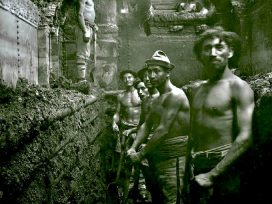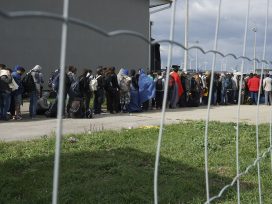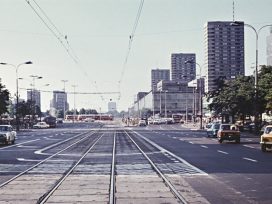Dear friends
During the past two weeks, I was touring with my latest film The Congo Tribunal, which documents a civil society tribunal that we set up in the part of the eastern Congo afflicted by civil war. The tribunal put the local government, the United Nations, the World Bank and the large mining multinationals on trial. My tour took me to Germany, Switzerland and Belgium (unfortunately we have no Austrian screening licence, though one might be granted at some point).
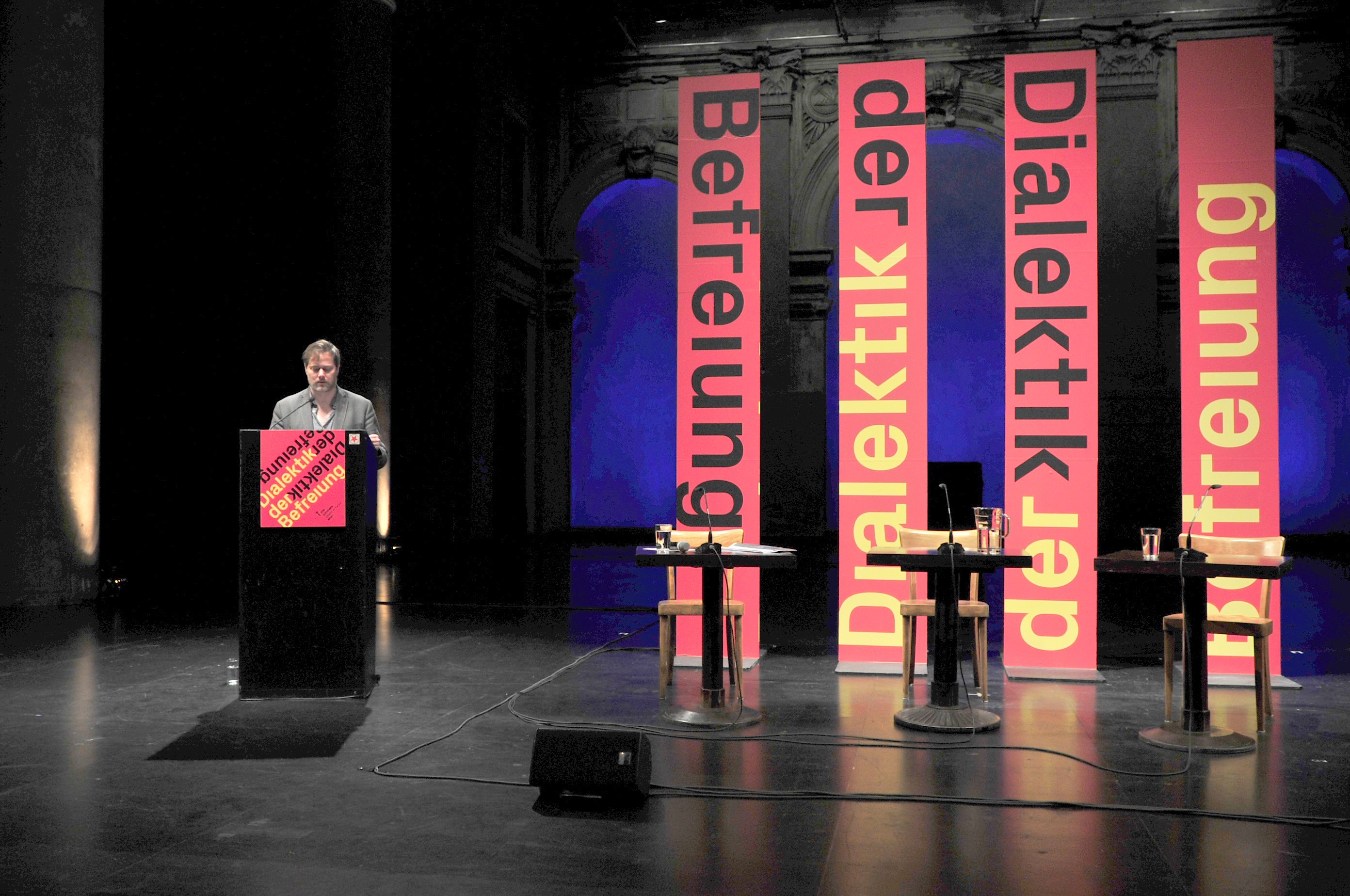
© Alte Schmiede/Mehmet Emir
Every evening, I watched my film about the Congolese mining industry once more. It is probably the same for most directors: the interesting part begins after the film is over, when the debate with the audience gets going. When in July we showed the film in the eastern Congo, in towns hit by the civil war and in mining villages, the screening was scarcely over before the audience started handing over evidence in the form of photos and written witness statements to our investigating judges and to myself. They reported that the economic crimes and massacres presented in our film continued to happen or they referred to completely different cases of which we should take note. Since 1996, the civil war, which is in truth a war over the coltan and gold in the eastern Congolese earth, has left seven million people dead following over 1,000 cases of mass expulsion, mass rape or simply – intentional and planned – deprivation.
When we screened our film in Hamburg, Berlin, Brussels, Zurich or Geneva, something similar happened: the audience came to us, they told of comparable cases, almost every Swiss, Belgian, German firm is implicated in a crime of the same or greater magnitude as the two companies that we cover in the film. Names were mentioned such as Monsanto, Glencore, VW, KiK. The longer one listened, the stronger the feeling became that we are all living in a nightmare, except that we are fully conscious. And that was also the final conclusion that Robert Misik drew, one of the stenographers in our World Parliament, the so-called General Assembly held in Berlin three weeks ago – a parliament of all those who are affected by European politics but have no say in our parliaments. Misik listened for three days, for 20 hours to the statements of textile workers from Bangladesh, carmakers from Brazil, Congolese mine workers and he said: the World Parliament is not a site of dreams but of nightmares. So abominable, so absurd, so unjust is the world in which we live.
‘Today, neoliberalism no longer represents free competition but signifies an almost absurd monopolistic system that is reminiscent of the medieval church.’
The title of my speech is ‘Recapturing the future’ – for the nightmare of which I speak does not only stretch back into the past like the typical nightmares that one hears about at school, but also into the future. Allow me to explain. Before a mine can be opened in the eastern Congo, an average of 12 years passes from discovery until the day on which all of the machines, ventilation systems, accommodation, supply chains, etc., are in place and mining commences. The finance required amounts to billions of dollars, with costs often multiplying several times over due to the civil war. Such sums mean that the competition is limited to a few European and North American firms – in the eastern Congolese mining sector, for example, only one single company mines gold: the Canadian firm BANRO, on which my film The Congo Tribunal focuses. Neoliberalism once competed with state monopolies, it was celebrated as the great liberator and hated as the great deregulator. It was only as a result of the World Bank causing the break up of the Congolese mining industry in the 1980s that BANRO, an investment company, entered the gold business in the first place.
Today, neoliberalism no longer represents free competition but signifies an almost absurd monopolistic system that is reminiscent of the medieval church – an economic system that is not only supported by local government militias but also by the regulatory and ultimately the ethical laws of European and American parliaments, the absurd requirements of which push local producers into illegal operations. In autumn 2010, the US Congress passed the Dodd-Frank Act, a regulatory law that forbids practices in Congolese mines such as child labour and work carried out by pregnant women. Subsequent to which, between two and five million workers are estimated to have lost their jobs in the mines – for the majority of the working Congolese population is under 18 years of age, and most young women are almost continuously pregnant. This provides a pragmatic link to the theme of the following days, the ‘Dialectics of Liberation’: what seems to European consumers and to the parliaments of the western industrial nations to be ethically desirable, a step toward protecting and thus liberating the children and women of the Congo, is a step towards their impoverishment, towards their enslavement at the hands of the mining companies and the militias.
Realism – realistic politics, realistic art – can only be to listen to those voices that know what is going on – and draw upon these voices in establishing one’s own view of matters. Trapped within our own logic, what we perceive from a distance as being correct is often completely wrong. The present seems inevitable, hermetically sealed, particularly in today’s world, in which everything is oriented, one could say ‘pre-programmed’, towards profit. We return once more to the eastern Congolese mining industry: the crucial point is not the greed or the amorality of the mining companies themselves – the small prospectors are just as greedy, something that we also show in our film – but the complex funds and investment structures behind these companies. If, as a mine manager from BANRO explained to me, the billions invested cannot be amortised within three years, first the firm, then the fund, then the relevant commodity market collapses – and Europe and the United States end up in financial crisis.
‘How is it possible to break out of this nightmare of social Darwinism, out of this nightmare that began with the demand for liberation?’
It is a case of each man for himself, the same applies to all involved: there is little time to set up local infrastructure, education or anything at all long term, since our own wealth, the wealth of our welfare states and therefore, in the final analysis, our democracy is dependent upon the stability of the market. It’s either us or them, either the Congolese or the Europeans. The present has on the one hand, as the British-Indian intellectual Pankaj Mishra says, been universalised, we find ourselves in a single world space, there is no longer a West and an East, a North and a South, there is no outside, everything is connected within a single economic context and if the gold price falls in Toronto by five percent, 10,000 prospectors in the eastern Congo lose their jobs. On the other hand, our activities are entirely oriented towards the future or to put it another way: the present, the glory of our days, everyday life and ultimately the meaning of life for billions of people and quadrillions of other creatures is now merely a transitional zone in the age of financial capitalism, a zone in which the future has to realise itself. For the future is sold before it has taken place – it is our task, that of civil society, to recapture it.
But how is it possible to break out of this nightmare of social Darwinism, out of this nightmare that began with the demand for liberation? Today, this demand has grown irrational, such that it works to the advantage of the tiniest minority and causes the overwhelming majority to suffer. How to break out of a nightmare that will end fatally for us all, or at least with an ecological and social catastrophe on an unprecedented scale – for us all, because humanity shares a common fate and neither the climate nor the global economy knows any borders. It is as if a meteor were to speed towards the Earth, but instead of seeking solutions, we speak about whether this meteor really exists – and if so: who then is responsible, who is allowed to speak about the meteor and in what manner and how should the people who are allowed to speak about it be elected? Those who are realists, even if only at the outset, feel imprisoned in a kind of counter-reality, at the latest since the election of Donald Trump. The world has changed since his election, or perhaps merely shown its true face. The impossible, the lies, the scornful insanity, power’s deadly routine of repression has become a reality, mundane even. The Titanic is sinking and it is as if we are preparing ourselves for the farewell dance by squeezing once more into the uncomfortable costumes of a time long gone, costumes that are not only uncomfortable, ridiculous, loathsome but above all have the disadvantage of once again delaying the global political solutions long since required. And this time, I fear, the consequences will be irrevocable.
How is this impasse to be explained? Three weeks ago, the German weekly Die Zeit published an investigation revealing that, during the course of the last 20 years, 80 percent of the biomass of insects in Germany has disappeared – yet German politics exclusively concerns the negotiations for building a coalition that has so far failed to materialise, though it may still do so, just involving other parties, who knows. The day before yesterday, I sat on the train, travelling as ever from one screening of The Congo Tribunal to another. An image was in circulation all around the world in which the Syrian dictator Bashar al-Assad and the Russian dictator Vladimir Putin embrace, congratulating one another upon the imminent victory over ‘terrorism’. Who would have suspected five years ago that Assad would remain in power? Why do we not throw up our arms in despair when the insects disappear: ‘If the bee disappeared off the surface of the Earth, then man would have only four years of life left. No more bees, no more pollination, no more plants, no more animals, no more man’, Einstein is supposed to have said. But it is as though we sit paralysed before all these apocalyptic images in which evil appears to be good, lies entertaining, catastrophe normal. It is like Pieter Brueghel’s famous oil painting of 1556, not long after the great peasant wars: deep in the background, Icarus plunges into the sea, scarcely visible, while in the foreground a ploughman goes unwaveringly about his work. Symbol of a present that, precisely because of the mythical catastrophes then taking place, seems to be replete with an almost absurd calm, an eternal peace.
Yet the only way to break out of the totality of now is to observe it from afar. From the standpoint of the future, to look back upon oneself with a utopian eye, as it were – or, vice versa, to seek comparable moments in the past, epochal disjunctures that are just as absurd, just as nightmarish. At the beginning of every revolution, we say, there is an anti-narcissistic reflection, a reflection of the self in that which has become completely alien, in that which has elapsed, which has failed. A few days ago, I received an email from a German producer with the following suggestion: I should, he wrote, create a film based on a script about the reformer and social revolutionary Thomas Müntzer, who was initially a companion of the far better known Martin Luther and, later, once the people were liberated from the yoke of Catholicism and aristocratic paternalism and wanted to make Luther’s demands a reality, his opponent.
Thomas Müntzer, and the peasants with whom he was allied, wanted a revolution in social relations to follow Luther’s Reformation; the universalist Müntzer counted ‘Christians, Jews, Muslims and heathens’ as worthy of God’s salvation. For his part, Luther – soon after his Ninety-Five Theses of 1517 became entangled with all manner of financial and church dependencies – only wished to grant a small group passage to eternity: the reformed Christians, of course. However, having liberated the individual in the church context and done away with the requirement that he himself remain celibate, Luther no longer wanted to change anything else at all in terms of earthly social and political conditions. When the Great Peasants’ War broke out, Luther therefore published a pamphlet calling for the princes to ‘slay’ the rebellious peasants ‘like rabid dogs’. Over a hundred thousand people were killed during the punitive campaign that followed the brief spring of anarchy in 1525. The mercenaries rampaged through the villages, hacking off peasants’ feet and hands, blinding and raping them – completely indiscriminately, gleefully, sadistically, with that unfettered anarchism of power that Pier Paolo Pasolini described in considerable detail in The 120 Days of Sodom. Müntzer himself was tortured for days and finally beheaded, his head and body displayed on spikes in public – a massacre that Bruegel portrayed in another painting, which has a nonchalance about it comparable to that displayed in Icarus.
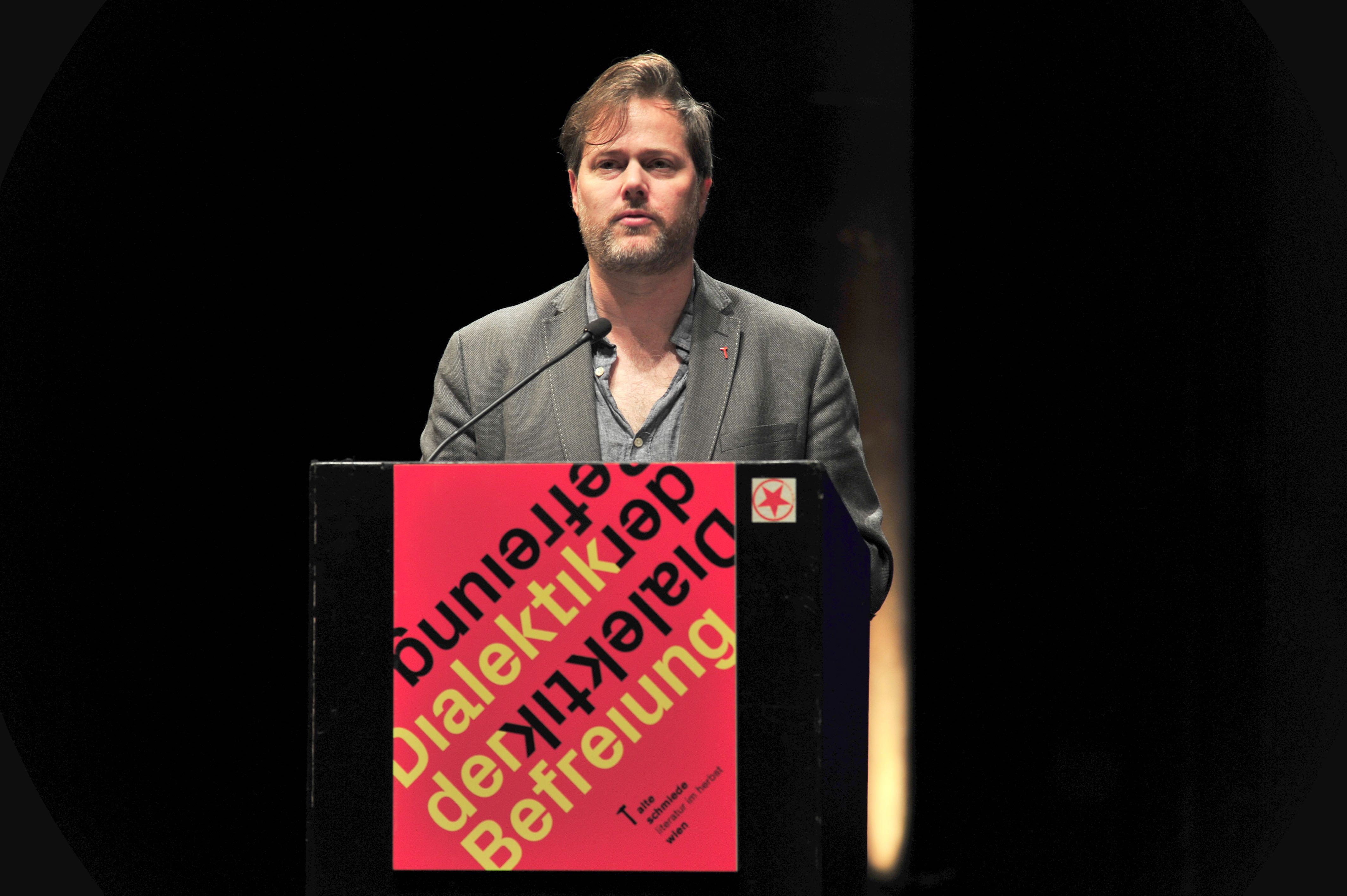
© Alte Schmiede/Mehmet Emir
However, what particularly interested me about Luther’s works and his theories, as I began to read them between screenings of The Congo Tribunal, was this: their almost somnambulistic feel for the thresholds that shaped the world in which he lived – those thresholds at which the Reformation became revolution around 1500, at which a reformer became an enemy of the people and a revolutionary an outlaw. For surprisingly, Luther was not burned, the rulers of the principalities and the urban centres of early capitalism quickly rallied around him. In the new denomination, they saw their chance for self-determination, for the liberation of towns and cities from the diktat of the Emperor and the Church – and they didn’t want this taken away from them by people like Thomas Müntzer, who declared war on the princes and urban centres of early capitalism. Luther even formulated an article of faith that remains relevant today: only the inner man is truly free, he wrote, the outward man remains subjugated to the powers that be. And this is supposedly the birth defect of modernity, something that the first ‘Dialectics of Liberation’ congress in 1967 dealt with in all of its aspects by the way: this schizophrenia of modern man who, as Hannah Arendt said of Adolf Eichmann, is incapable of recognizing himself in his actions, in his practice. I once called this ‘cynical humanism’: practice and thought walk alongside one another in the case of the modern, post-medieval human, like two ponies separated by an opaque wooden partition. The upshot of cynical humanism, of which Luther is the father, is that the world can always be run by devils – this does the soul or, in more modern terms, the individual no harm. One can sign a petition against blood minerals without any problem at all, using a cheap mobile phone bought with the blood of thousands of displaced or massacred Congolese hill farmers. Whoever actually rebels against the world though is a dangerous madman, a ‘rabid dog’, as Luther said, a ‘terrorist’, as Assad and Putin would say, but at best a fool.
On my journey through the cities in which The Congo Tribunal premiered, I read the critics in the bourgeois press. There we are ironically billed as the ‘world’s saviours’, our attempt to create a global economic court branded ‘vain’, ‘dangerous’, ‘utopian’ even, ‘irrational’ and ‘megalomaniacal’. The same was said of our World Parliament: megalomania combined with vanity and a pinch of a Stalinistic fantasy of omnipotence. But which megalomania, which utopia, which vanity and fantasy of omnipotence can counter this incomprehensible, all-embracing utopia of capital, which has sold off entire parts of the world and even the entire planet during the course of decades, of centuries? Is it not so that we intellectuals, we artists must first grasp the extent of the irrationality, or even of the deadliness of our times, in order to actually be realistic? How much energy and madness is required in order to awake from the dream of capital – which not only the powers that be but also the subjugated dream? A report on the Red Army Faction terrorist Gudrun Ensslin that I read a short while ago on the aeroplane begins with the rhetorical words: How could she do that? Revolt, basic revolt, seems like insanity today. And its failure seems like proof of the senselessness of any kind of resistance.
‘If it is necessary to reclaim control over the world that is currently caught up in a nightmare – who can do this, how and with what means?’
Thus we arrive at the point that really concerns me: allow us to be crazy, allow us to be fools. After all, it is only fools who are realistic today, as they do not discern a difference between what they know and what they do. After all, it’s not just about what we know, it’s about what we do – it’s about restoring the link between theory and practice. In order to excuse Luther – his love of the princes, his deference to authority, his contempt of peasants, women and, in the end, as we know, even the Jews – to excuse all this, it is often stated that he was simply a ‘man of his time’. But Müntzer too was a man of his time, it is just that he reached other conclusions about it: namely that he would try to change it, to make it inhabitable.
Thus we arrive at good old questions about the revolutionary subject. Or, expressed differently: if it is necessary to reclaim control over the world that is currently caught up in a nightmare – who can do this, how and with what means? Colson Whitehead, who is also to speak during this festival, writes in his wonderful book, Underground Railroad, of a secret network of escape routes for slaves in nineteenth-century America – a network run completely in parallel to the existing US states, all of which had their own repressive laws that sustained the status quo – in other words, slavery – using the police and political means: ‘underground railroad’ is the (by the way completely historical) description of a parallel structure that civil society created at the time because the American political sphere itself was not capable of doing so or did not want to. The underground railroad was of course a revolutionary subject: it meant a huge number of people united by neither gender, nor status, nor anything other than their common undertaking. That is, united only by their condemnation of slavery.
One could also say, by a basic assumption. The fundamental problem for Herbert Marcuse, one of the most important participants in the Dialectics of Liberation congress fifty years ago, was the fragmentation of civil society’s struggles at the beginning of what one later called postmodernity: there was no longer a universal subject, who – like the peasants in the German Peasant War, the Third Estate in the French Revolution or the proletariat in classical modernity – could have initiated a major ‘revolution’. On the contrary, everyone was thrown back to their own struggle, according to Marcuse, a sentiment that continues to be felt in circles on the left today. There is a dominant feeling of isolation, remarks the French philosopher Georges de Lagasnerie writing in an essay published yesterday in the Swiss Wochenzeitung, and: ‘If I had to describe the current political situation with just a single concept, then it would be powerlessness.’
The Dialectics of Liberation congress analysed this fundamental – epistemological and therefore practical too, because it affects the way one lives – powerlessness and, in the process, people’s practical lack of feelings under capitalism. Should there be a lack of the sympathy that becomes solidarity and then political action – then there is no revolution. However, Marcuse saw this powerlessness, which today has taken on almost metaphysical proportions, as fundamentally surmountable. He – and, with him, the entire Frankfurt School – was convinced that alienation could be surmounted, that a world managed to death would soon end specifically as a result of the liberation of the individual, of his drive structure. More precisely still: western people’s drive structure. For oddly enough, Marcuse was exclusively interested in the spiritual liberation of central Europeans and North Americans from alienated employment. But who would be responsible for their liberation – the liberation of the Third World that, in the postmodern period, was supposed to make possible the financing of industrial work that was in fact mostly outsourced from the First World – who would be responsible for all the cheap products stocked on the shelves of us German, Swiss, Austrian or French libido artists, if not the proletariat of the Congo, of India, of South America: he never asked himself this question. And thus things remain, strictly Lutheran to a certain extent: perhaps ‘liberation’ applies to all in theory but not in reality. Today, 50 years after Marcuse, the European master race, liberated from within, has tightened up the regime over the Third World until it has become unbearable: for our liberation is in fact dialectic, namely antithetical, as it is linked to the continuous and increasing enslavement of the Third World.
What then is to be done? I think that we have to begin to think once again about local and global struggles as being linked, to bring them together in all of their contradictoriness. We must do the demanding work of concrete universalism, step by step. What we need is an aesthetic, but also a politics, of global democracy that thinks beyond the Lutheran-Marcusian human: that seeks not the liberation of one at the cost of the other but precisely the solidarity of all in light of the knowledge of the shared lack of freedom. Expressed differently: we must once again think ourselves capable of empowering ourselves, we must return from immanence to transcendence, from psychopolitics to Realpolitik, from reformation to revolution. From the practice of resistance, of protest and of reflecting upon aesthetics, there must once again emerge the production of a new revolutionary subject.
‘During three days, there emerged something like a subject, a revolutionary subject … the first World Parliament not only of people but also of non-human actors.’
And thus I shall gradually conclude, namely with a proposal for what I would call solidaric liberation. Please excuse me for speaking yet again about one of my own projects, but as a director, I think in terms of projects, works, films and not of concepts or books: a few weeks ago, we – together with over 30 organizations – set up a World Parliament in Berlin, the so-called general assembly, which we will expand upon further in the coming years, I hope. Seventy delegates from about 20 countries discussed climate change, international diplomacy, the regulation of world trade, national sovereignty, freedom of opinion and – as demonstrated when I threw an AKP supporter out of the assembly hall because he denied the Armenian genocide – the limits to freedom of opinion, anthropoids, the oceans, insects, the meaning of words such as ‘protection’ and ‘security’, orthodox temples in Serbia and textile factories in Bangladesh. We spoke about patents and belief, the past and the present, the right to life and the right not to be born – in short: a whole spectrum of themes about which probably no one, no woman or man, would even have had enough basic knowledge to reflect upon alone. Neither would this have been called for, since during three days, there emerged something like a subject, a revolutionary subject; a parliament assembled, a parliament not only of people, but also of animals, things and, if you will: of concepts, ideas – the first World Parliament not only of people but also of non-human actors.
Who empowered us to do this? No one. Every single delegate could have said, just as Luther did in 1521 at the Diet of Worms: ‘Here I stand, I can do no other.’ For beyond moral dilemmas, beyond the pressure that stems from the facticity of suffering, indeed: beyond the pure statistical facticity of their exclusion from the capitalistic decision-making centres and ‘future factories’, which the delegates at the General Assembly expressed through their very presence alone, no one legitimated them to work in Berlin at the beginning of this month on a document with such a megalomaniacal title as Charter for the Twenty-First Century.
And nonetheless, they were asked, like the peasants in the Peasants’ War, like the councils in the Council Republics, like the lawyers and preachers in the first Assemblée Générale of 1789: who legitimates you? What gives you the right to refer to humanity, the oceans, indeed, even to the dead and the unborn? Who authorised you to invoke the past, to capture the future? In response to which, one must ask: who legitimated the current rulers of the world? Does the World Bank carry out global elections before driving whole countries to ruin, smashing entire cultures? Were the insects in Germany consulted before 80 percent of them were exterminated? Before the American Congress passed the Dodd-Frank Act in 2010, leading as previously mentioned to five million unemployed people in the eastern Congo, was the local population heard? Was the coming generation asked whether they – in order for us to take another holiday on a distant island – want to live in a world of storms, fires, floods and war?
‘Let’s not fool ourselves: the revolution offers no site of consensus – and never will.’
The legitimation of revolution – and this is what I am calling for here: for a revolution of human relations, social institutions, the global market economy – the legitimation of the revolution lies in the fact that there are no legitimate global institutions – just as the legitimation of the French Revolution lay in the fact that the Third Estate was not represented in the king’s parliament. The question for the Third Estate at the end of the eighteenth century was not: who gives you the right to demand your rights, to liberate yourselves? And neither is this the question for today’s global Third Estate at the beginning of the twenty-first century. But: how could you be so thoughtless, so paralysed, indeed, so mad that you have not already done so long ago? How come all of us here did not start a revolution long ago? How come we did not storm the world’s parliaments, the World Bank and the UN General Assembly long ago, just as earlier generations stormed the local and elite institutions of their time? In the same way as, during the lifetime of Thomas Müntzer, the peasants set fire to their feudal masters’ castles, and not just one but hundreds of castles?
Let’s not fool ourselves: the revolution offers no site of consensus – and never will. Every world parliament, every liberation movement, precisely because it attempts to be democratic, is unhappy in its own way, to use a phrase from the beginning of Tolstoy’s Anna Karenina. The happy consciousness that Marcuse was still searching for, the playful, happy, harmonious revolutionary subject will never exist. The General Assembly held in Berlin was a site of contradictions, at certain moments even of self-laceration. When I, in my western European self-righteousness, threw the Erdoğan supporter out of the parliament because he denied the Armenian genocide, another delegate also left the chamber in protest: Bernard Swartbooi, former Namibian agriculture minister and one of our vice-presidents. Erdoğan’s Turkey is, he said to me later, the only European country that recognizes the Herero genocide committed by German troops at the beginning of the twentieth century (around the same time as the Armenian genocide) and financially supports Namibia in dealing with this chapter in the country’s history. Global memory politics can operate in so many different ways, it is so confusing.
No, revolution is not simple: global democracy, which is a democracy based on contestation, is not to be confused with inconsequential cosmopolitanism, with pseudo-ethical superficial reforms that are nothing more than the cynical hallmark of the auctioned sky over a globalised world. We can stage as many Dialectics of Liberation congresses as we like, if those who have in fact paid the price for our freedom, and continue to pay, do not participate. For global capitalism is, like Luther’s feudalism, like the Fascism of the Third Reich, a blind predator: it does not push individuals but billions of people, animals, species into oblivion, it commits genocide daily, hourly and for the most part without us ever experiencing any of this. Yes: capitalism itself took up the cause of liberation, it insisted on the word revolution, it is just that in lieu of the tenderness of peoples, and specifically of the practice of solidarity, it pushed the eternal hunger for consumption. And thus it comes to pass that, besides the genocides of animals and future generations, besides the genocide of real and possible life forms, as well as what Marx called the genocide of the lively, real cultures of our ancestors – and with the past sinking into death and forgetfulness, the very future of all these beings, whether human or non-human, also disappears.
In Theses on the Philosophy of History, the philosopher Walter Benjamin writes the following – a quotation that cannot be repeated often enough, or I cannot in any case repeat enough: ‘A Klee painting named Angelus Novus shows an angel looking as though he is about to move away from something he is fixedly contemplating. His eyes are staring, his mouth is open, his wings are spread. This is how one pictures the angel of history. His face is turned toward the past. Where we perceive a chain of events, he sees one single catastrophe which keeps piling wreckage upon wreckage and hurls it in front of his feet. The angel would like to stay, awaken the dead, and make whole what has been smashed. But a storm is blowing from Paradise; it has got caught in his wings with such violence that the angel can no longer close them. The storm irresistibly propels him into the future to which his back is turned, while the pile of debris before him grows skyward. This storm is what we call progress.’
We must fix our eyes upon the catastrophes that we have behind us – and on the catastrophes of which we are the witnesses. For the atrocious has not happened, it is happening now, it is about to happen. We are entering an era of catastrophes: human, ecological and finally philosophical catastrophes. We are piling wreckage upon wreckage. It is time to change perspective. We need a commitment that opposes the pessimism of the intellect, as the philosopher Antonio Gramsci put it, with the optimism of the will. So that the angel of history can use his spread but powerless wings once again to fly, so that he can switch from being an observer to an actor. So that he directs his distracted gaze away from the past and once again toward the future. So that the fallen Icarus can take flight again.
What else? What remains if the peasant forces were driven apart by the mercenaries, the Council Republic was crushed, Napoleon put an end to the revolution, Trump, Erdoğan and Orbán closed the universities and editorial offices, and the World Parliament ceased to convene? If the Charter for the Twenty-First Century was postponed owing to disunity – as was the case at the General Assembly? To be completely honest: I don’t know.
When we meet to talk about our works and films, as now, and the time comes for us to depart, we are often asked: ‘What is to happen after you leave?’ To this, we each respond, since there is no other answer: ‘We don’t know.’ I am only an artist, not a revolutionary; and my actions are therefore symbolic. For example, what we did in The Congo Tribunal – conduct a public hearing of three cases of mass crimes in the Congolese civil war zone, adjudge the companies guilty, allow those affected to experience justice – was not a trial in the sense that it could have led to sentencing. It was at once more and less than that: it was living proof of the possibility of such a tribunal. Several of our experts have since been abducted. Whether the Congolese presidential elections will ever take place is anybody’s guess – as is the answer to the question about whether the opposition candidates we support can change the country’s political landscape. As for the General Assembly: we currently do not even know how and whether we will be able to finance the next session. And when exactly it will take place. And where.
But as the great film-maker Andrei Ujica once said to me during a discussion about the Romanian Revolution: even if the Stalinist apparatchiks remain in power as today’s economic elites – for the people who made the 1989 Revolution happen, the days of the uprising continue to glow like embers in their souls. The splendour of revolt consists in its knowledge of its failure, of the limits to freedom, of the finite nature of life and the ultimate futility of all hope. Thus revolt allows space for doubt, but also for a rebellious ‘in spite of’, so that one travels to the Congo and works on a tribunal there, even if in the end, only three cases out of a thousand are heard. So that one exposes oneself to the extent that every bone in one’s body is broken, so that in the end one lags behind, exhausted and wounded all over.
‘The windows of heaven are wide open’ according to a religious song that, as it happens, Martin Luther introduced to the German public. Solidarity, community – like the solidarity and community at our World Parliament, like that at the congress – with these, I believe that the windows can be flung wide open. And even if they are slammed shut again straight away: one will have briefly seen the sky.
I thank you for your attention and your patience.
This speech was delivered by the author at the Odeon theatre in Vienna on 24 November 2017 at the ‘Dialectics of Liberation’ symposium, part of the Vienna’s ‘Literature in Autumn’ festival.







